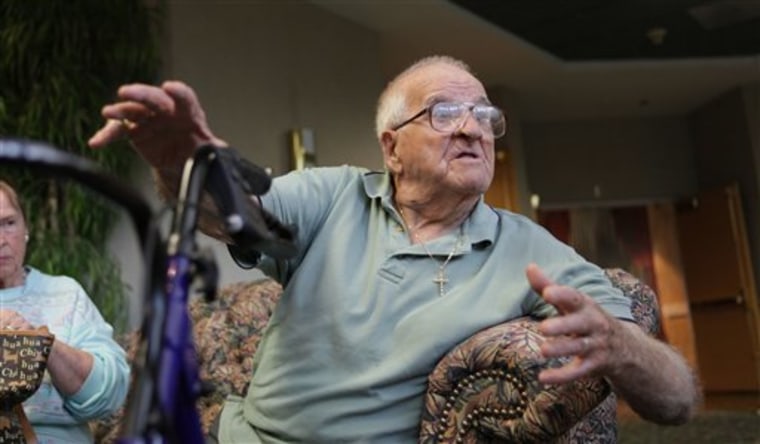Over the past 50 years, the Greatest Generation has learned to get by through wars, a depression, and a few recessions. So they are not daunted by the prospect of no increase in their Social Security payments.
They are puzzled, though.
If her check were bigger, 76-year-old Agnes Conti might be able to spring for a better cut of meat for her pot roast. She could afford to send her nine grandchildren more than $20 for their birthdays and Christmas. She'd be able to buy some nice new clothes, like she sees on QVC, not what she settles for at Walmart.
If only. The government has said the Social Security checks Conti and tens of millions of other seniors rely on as their primary source of income will not increase next year as consumer prices have fallen overall. And while the retired hospital clerk will get by, she'll be watching her spending even closer, knowing she can't expect the annual raise she's been accustomed to.
"We were good citizens all our lives. We went to work, we lived by the book, we weren't on welfare, we didn't ask the city for anything," Conti said while taking a break from crafts at a senior center here. "And what do we get?"
At the Southwest Focal Point Senior Center in this Fort Lauderdale suburb, seniors lamented the cost-of-living freeze and praised a White House plan for $250 checks to soften the blow. But they took all of the news in stride, saying they've had a lifetime of experience living on a fixed income and would manage with the money they currently receive.
Frank Ferreira sits in the center's lobby, near a decorative fireplace and an autumn centerpiece. The 90-year-old retired truck driver loves to sing, even practicing on a karaoke machine at home, and loves to dance even more. He gets about $890 a month from Social Security, most of which he hands over to his daughter to help pay his share of the bills.
The money isn't the biggest issue, Ferreira said. It's the message the government is sending about caring for seniors.
"I could use a little more, but that's all right, I get along," he said. "But I think that we deserve it, the elderly. You can't just discard them. You've got to help them."
Nearby, 89-year-old Miriam Danzinger is shuffling along with a walker. She gets about $1,300 monthly in Social Security, and after rent and other expenses, including a MediGap plan, she has little to spare. Her daughter helps pay her bills.
When her Chevrolet Cavalier broke down a few months back, Danzinger was forced to give it up. When she goes to the store, she's thrifty, having learned how to cut grocery costs when she ran a coffee shop. She lives as simply as possible.
"Listen, there's no money. People are going hungry," she said. "But what can I say? I'm only a little ant."
The freeze in next year's checks is the first since automatic Social Security cost-of-living increases were adopted in 1975, and follows a 5.8 percent increase in January, the largest since 1982. By law, the adjustments are pegged to inflation, which is negative this year because of lower energy costs.
The Obama administration plan to send $250 stimulus payments to about 57 million seniors, veterans, retired railroad workers and people with disabilities, would amount to a roughly 2 percent raise for the average Social Security recipient. If approved, the checks would cost about $13 billion, though there is no plan yet how to finance them.
While seniors here have grown used to the annual raises, many of them said they're willing to cut the government some slack given the recession and the federal deficit.
"When they have the money, they give us the raise. If they don't have it, they don't have it," said Lucy Polieto, a retired waitress who lives in Southwest Ranches. She wears a glittery gold sweater and chains around her neck, and walks with a spry bounce that belies her 94 years. "Sometimes, I'm so surprised when I look at the check and I get a raise."
The news this week that checks would be stagnant is buffered by some positives: Seniors won't be getting any less than they already do, most recipients' Medicare part B premiums will freeze as well, and the president's plan could soften the blow. But because the one-time stimulus payments won't be a lifetime raise, it means many seniors will never see what amounts to thousands of dollars.
For those in poverty, the raise could have made a huge difference. But for the average senior simply living on a fixed income, it is seen less in dollars and cents, and more in the tangible costs they might be more careful with.
Polieto cooks eggplant, chicken cacciatori and pasta fazool. A raise could have given her more leeway with her grocery bill.
"Then I could buy some steaks, maybe," she said. "But I'd rather have a pork chop."
